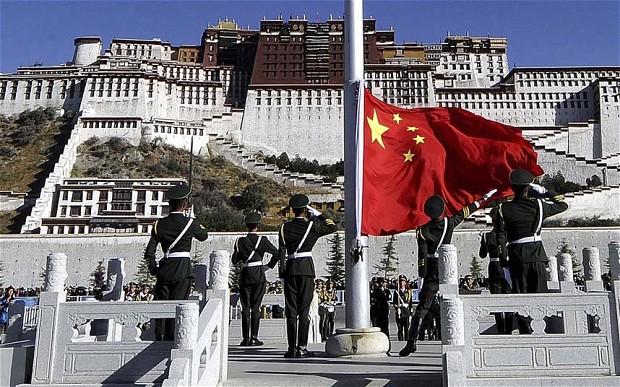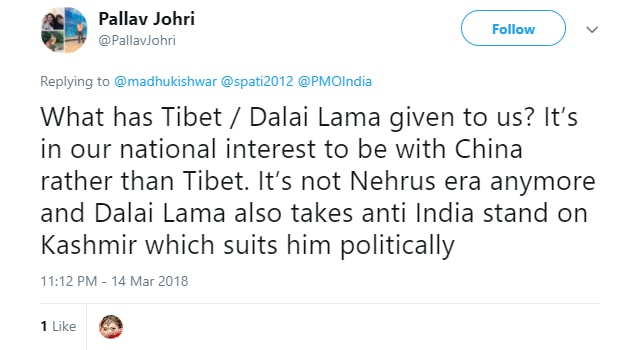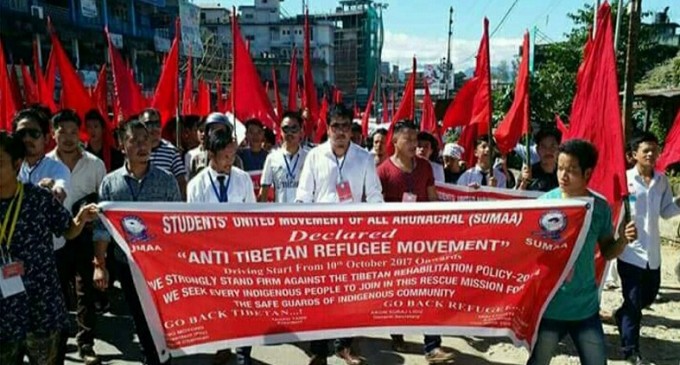An article on India Today addresses the context behind the Indian government’s recent memo to their officials, directing them to avoid ‘Thank You India’ events organized by the Tibetan leadership. Issued on the instructions of Mr. Vijay Gokhale, the newly-appointed Indian Foreign Secretary, the memo heralds his government’s new direction of distancing themselves from the Tibetans.
Gokhale is widely considered to be the Indian government’s foremost expert on China. He was appointed to his post at a time when India was locked in a standoff with China over the Doklam area. Gokhale is credited as having a significant role in the resolution of the crisis and pulling his country back from the brink of a war with China. Now this distinguished diplomat, with his impressive portfolio of dealing with the Chinese, has set his sights on the Tibetans as part of a wider plan for improving India’s relations with China. Gokhale’s new stance towards the Tibetans aims to prevent them from becoming a catalyst for further close encounters with China, who views the Tibetans in-exile as ‘separatists’.

However, according to the author of the India Today article, the success of Gokhale’s plan is dependent on which branch of the Indian government is allowed to prevail. The Indian government is currently divided between two positions: the Ministry of Defense’s assertive approach which clashes with the conciliatory approach favored by the Ministry of External Affairs. With Gokhale as Foreign Secretary, and in light of the assertive approach failing in Doklam, India now seems poised to pursue the conciliatory route when engaging with China. Naturally, this does not bode well for Tibetans in India, who have always taken an antagonistic and hostile view of China. A conciliatory approach to Sino-Indian relations means that future policies are set to sideline the Tibetans in favor of China.
The India Today article thus presents a succinct summary of the current situation between India and China. Its author, who is an experienced journalist and published author, also draws on his expertise to present a clear and truthful picture of how and why the changing political atmosphere will impact the Tibetans.
The truth of the matter is that:
- Tibetans are no longer important for China or India. After the geopolitical changes of 1959, His Holiness the Dalai Lama entered exile and established the Tibetan exiled leadership in Dharamsala, India. They have since been downgraded, forced by India to call themselves the Central Tibetan Administration (CTA) instead of the grander-sounding ‘Tibetan Government-in-Exile’. The Dalai Lama then embarked on a decades-long global campaign to raise awareness of his people’s situation and to garner support for Tibetan independence. More recently, the Dalai Lama has shifted his stance, calling for meaningful self-autonomy instead of full independence for Tibet. However, his conciliatory shift has fallen on deaf ears, reflecting Chinese ambivalence towards the Tibetans; Beijing is simply not interested in negotiating. The Indian leadership in Delhi has started to adopt a similarly-disinterested attitude towards the Tibetans, as evidenced by the most recent directive by Gokhale to Indian government officials. India is now making conciliatory overtures of her own to China, clearly demonstrating that she values a friendship with this Asian giant over and above whatever value the Tibetan exiled community represents.
- Tibetans are losing hope. The only reason Tibetans have remained stateless refugees for over 60 years, is because of the dreams fed to them by their leadership. They have been unwilling to give up their ‘Tibetan identity’ in favor of citizenship, whether Indian or otherwise, because the CTA sold them the idea that they will one day soon return to Tibet. It is these empty hopes that have sustained them through the most difficult periods of their time in exile. Yet, no period has proven more difficult than the current one and the Tibetan exiled community are yet to face their biggest challenges. Due to the recent turn of events, especially with the painfully obvious cancellation of the ‘Thank You India’ event in Delhi, Tibetans are fast realizing the reality of their situation – that is, they are losing support, even on their ‘home turf’ of India and this is swiftly causing them to lose hope. If India, traditionally their biggest supporter, is turning on them, who will be next? Making matters worse, ordinary Tibetans cannot afford to migrate abroad to escape an uncertain future given rapidly-changing Indian politics. They have no idea what is in store for them and, hit with the realization that their future lies in other people’s hands and at the mercy of other people’s politicking, this worries them.
- Whether privately or in formal government, Indian support for them is waning. Thanks to the Dalai Lama’s prestige and the reverence that the Indians hold for him, the Tibetans have generally been warmly received by the Indian people. It is a positive reception that has been extended to them purely through their association with the Dalai Lama. This has been the case since 1959 up until recent times, when strong evidence arose to indicate that this support and welcome has eroded. For example, local Indians in Arunachal Pradesh protested against the state government’s preferential treatment towards the Tibetans. In Delhi, it is said that local Indians set fire to the Tibetan sweater market at Lal Qilla, enraged by the refugees undercutting prices and causing the Indian businesses to lose out. From the side of the government, apart from Gokhale, other members of the Indian leadership have also been calling out the Dalai Lama’s silence on various domestic matters throughout India, most recently with the Gorkhaland and Doklam issues.

Click on the image above to read many more interesting expressions of discontent by Indians about the Tibetans.
- There is no benefit to supporting the Tibetans. The Indian leadership have realized that there is really no benefit in upholding the so-called Tibetan cause. Most nations who claim to support the Tibetans have done nothing more than pay lip service to their so-called cause. Therefore, not only does the Tibetan cause lack any tangible international support but in upholding it, it only serves to irritate China and cast a shadow on Sino-Indian relations. There is no positive result in doing that. Conversely, the economic benefits of developing relations with China are much more attractive.

- The Indian government is putting India’s 1.2 billion citizens first. After all, the Tibetans are not Indians and have done nothing for India. None of the millions of dollars in donations they receive have ever been taxable, and the Tibetan community never uses those funds to improve on infrastructure and living standards for the Indian population. When they receive donations, Tibetans only help Tibetans; when dealing with the Indian government, Tibetans expect the Indian leadership to help the Tibetans. The Indian leadership in Delhi are now acting from the perspective that benefiting the majority (the Indian population) outweighs benefiting the minority (the Tibetans). At the end of the day, it is the responsibility of any leader to serve their own citizens first, before extending a helping hand towards refugees or people of another country. Certainly, refugees should never act from a position of entitlement and demands, as the Tibetan leadership have grown accustomed to doing. As a result of this, public opinion for the Tibetans is waning, as has been made clear on social media platforms.
- Tibet is not considered a nation state. Rather it is a part of the People’s Republic of China, a fact which has been reiterated time and again by foreign powers such as the United Kingdom, Sweden, Switzerland and even international bodies such as the United Nations. So why are Tibetans still fighting China, when the world’s powers no longer share their view that Tibet is its own country? Tibetans are fighting a lost cause; the world has moved on and accepted that Tibet is no more. This is exemplified by the fact foreign leaders are rejecting the Tibetan people and no longer meeting the Dalai Lama in an official capacity. The Australian Prime Minister made no plans to meet the Dalai Lama during the spiritual leader’s visit in 2017; countries like Botswana see more benefit in pleasing the Chinese; Mongolia has banned the Dalai Lama from entering; Nepal closed down Tibetan refugee reception offices; and Pakistan has sided with China. What more evidence does the CTA need to show that they are being sidelined in favor of China?
- The degenerating Tibetan situation is exacerbated by their own ineffectual leadership. Over the course of their 60-year exile, the CTA have made political blunder after blunder. This is a truth the Tibetans are waking up to, as evidenced by ongoing protests against the Tibetan Prime Minister Lobsang Sangay. Their ineffectiveness as a leadership is also mirrored in the fact they are constantly dividing their already-small community, rather than galvanizing them against their so-called enemy China. These divisions arose from the enforcement of divisive policies attacking the core of Tibetan life – religion – and they include the ban on the practice of Dorje Shugden, the unequal treatment of the Jonangpas, and their unwarranted involvement in the recognition of the Karmapa. These policies have not won them any supporters in the long run; these days, more protests are organized against the Tibetan leadership, than against China whom they blame as the source of all their problems. Tibetans are now even threatening to self-immolate because of the CTA’s continued abuses and neglect of their community, as opposed to self-immolating for the Tibetan cause against China. This would have been unthinkable just five years ago, let alone a decade ago.
- The CTA’s policies, designed to suppress their people, have created more enemies than friends within their own community. For years, the CTA have suppressed Dorje Shugden practitioners, making them pariahs in an already-fractured refugee society. Dorje Shugden practitioners have been barred from receiving medical treatment in Tibetan hospitals; the children of Shugden practitioners have been bullied out of schools while their parents have been stoned out of their homes in the Tibetan settlements. Shops and restaurants refuse to serve Shugden practitioners, while monasteries refuse to conduct funerary rites for Shugden practitioners who have passed on. Dorje Shugden practitioners have been barred from holding positions in the Tibetan civil service, and prevented from engaging in any political process such as voting. And not only have they been faced with additional bureaucratic hurdles to obtain travel documents, but Dorje Shugden lamas have been harassed anywhere in the world there is a Tibetan community. Now that international sentiment is turning in favor of China, there is no longer any utility in befriending the Tibetan leadership who are starting to feel abandoned, just like Dorje Shugden practitioners have felt for years. Without Indian support, the tables have truly turned. Yet, there is no cause to rejoice – it is sad that the CTA could have enjoyed the support of hundreds of thousands of Dorje Shugden practitioners, Jonangpas and Karma Kagyus, had they not spent decades alienating these groups thanks to their inhumane policies of segregation. The CTA has lost out due to their own failures as a leadership.
In view of changing political tides, recent events and a waning importance, the Tibetan leadership really need to take stock of their current situation, and of the diminishing support they face. They cannot continue expecting unwavering support in their pointless stand against China, who is fast becoming the most powerful nation on earth. Would it not benefit the Tibetan leadership to rethink their strategy, which has otherwise been completely ineffectual to date? If they really cared about their Tibetan way of life, they better take heed before being swept away by the Chinese tide.

Click to enlarge. (Source: https://www.indiatoday.in/magazine/up-front/story/20180319-tibet-india-ties-china-arunachal-pradesh-dalai-lama-boycott-1185632-2018-03-09)
MORE NEWS LIKE THIS